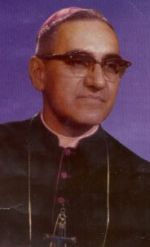 My hero in life has for many years been Oscar Romero, also known as San Oscar Romero de las Américas. Romero was the Archbishop in El Salvador and was killed for defending the rights of the poor and oppressed. The movie Romero is a way to learn about his life. In 2000, during the 20th Anniversary of his martyrdom, the film was allowed to be broadcast on television in El Salvador for the first time. I find great consolation in reading and reflecting on some of the things that Romero said and the tremendous example he gave with his life and with his death. I share some of these ideas with you here - it was for proclaiming these ideas that Romero was killed.
My hero in life has for many years been Oscar Romero, also known as San Oscar Romero de las Américas. Romero was the Archbishop in El Salvador and was killed for defending the rights of the poor and oppressed. The movie Romero is a way to learn about his life. In 2000, during the 20th Anniversary of his martyrdom, the film was allowed to be broadcast on television in El Salvador for the first time. I find great consolation in reading and reflecting on some of the things that Romero said and the tremendous example he gave with his life and with his death. I share some of these ideas with you here - it was for proclaiming these ideas that Romero was killed.
In addition to the movie Romero, the words of Romero can be found in a couple of books. One book that I enjoyed reading is called The Violence of Love. One book that I found particular insightful and would recommend for personal prayer is Archbishop Oscar Romero: A Shepherd's Diary. I found reading the translation of Romero's recorded diary to be a way of journeying with him. Another insightful book about Romero is The Church is All of You: Thoughts of Archbishop Oscar Romero, trans. by James Brockman, S.J.
Below are some of my favorite quotations that will provide a flavor for some of Romero's thought:
- "We must not seek the child Jesus in the pretty figures of our Christmas cribs. We must seek him among the undernourished children who have gone to bed tonight without eating, among the poor newboys who will sleep covered with newspapers in doorways." (December 24, 1979)
- "No one can celebrate a genuine Christmas without being truly poor. The self-sufficient, the proud, those who, because they have everything, look down on others, those who have no need even of God--on their behalf, will have that someone. That someone is God, Emmanuel, God-with-us."
- "Without poverty of spirit there can be no abundance of God." (December 24, 1978)
- Pero más vale ser libre en la verdad que tener mucho dinero en la mentira (7 de Mayo de 1978)
- But it is better to be free in the truth than to have a lot of money in the lie (May 7, 1978)
- Es un deber de una Iglesia auténtica su inserción entre los pobres, con quienes debe solidarizarse hasta en sus riesgos y en su destino de persecución, dispuesta a dar el máximo testimonio de amor por defender y promover a quienes Jesús amó con preferencia (15 de febrero de 1980)
- It is a duty of the authentic Church to insert itself among the poor, with whom they should become one with even to the point of sharing in its risks and its destiny of persecution, ready to give the greatest testimony of love by defending and promoting those that Jesus loved with preference (February 15, 1980)
- No sólo el predicador enseña, el predicador aprende. Ustedes me enseñan. La atención de ustedes es para mí también inspiración del Espíritu Santo. El rechazo de ustedes sería para mí también rechazo de Dios (16 de julio de 1978)
- Not only does the preacher teach, the preacher learns. You all teach me. Your attention is for me also the inspiration of the Holy Spirit. Your rejection would be for me also the rejection of God (July 16, 1978)
- La verdadera pobreza es preocuparse prefercialmente por los pobres como si fuera nuestra propia causa. Y por eso, también sentir que uno es pobre y que necesita de Dios la fuerza en todas las situaciones (16 de diciembre de 1979)
- True poverty is to preferentially worry for the poor as if it were their own cause. And thereby feel as well that one is poor and needs from God strength in all situations (December 16, 1979)
- El cristiano que no quiere vivir ese compromiso de solidaridad con el pobre, no es digno de llamarse cristiano (17 de febrero de 1980)
- The Christian who does not want to live this committment of solidarity with the poor, is not worthy being called Christian (February 17, 1980)
- En nombre de Dios, pues, y en nombre de este sufrido pueblo cuyos lamentos suben hasta el cielo cada día más tumultuosos, les suplico, les ruego, les ordeno, en nombre de Dios: ¡cese la represión! (23 de marzo de 1980)
- In the name of God and in the name of this suffering town whose cries rise up to heaven each day more tumultuous, I ask you, I beg you, I order you, in the name of God: stop the repression! (March 23, 1980)